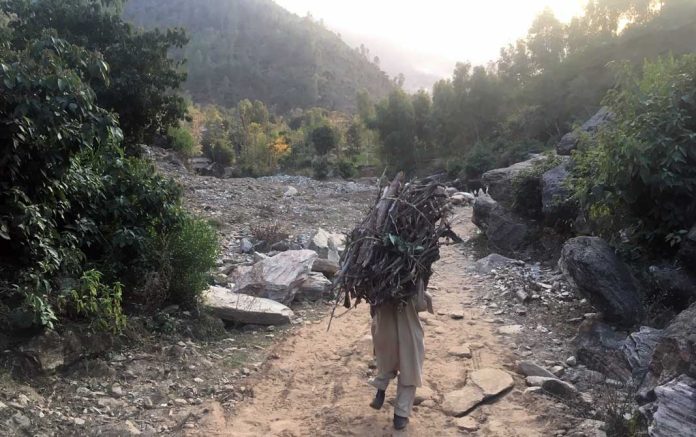North Waziristan Agency: It is early evening and the villagers have dined after evening prayers in the local mosque at Machi Khel, a small village surrounded by hills and green fields in the vicinity of Mirali subdivision in North Waziristan Agency. As the evening darkens, Tawab Khan Wazir and his brother Ayoub Khan Wazir leave home for their fields of maize crops about a kilometer from their house. Tawab khan has an axe in one hand and a torch in another. His brother also holds an axe and a flask of tea in his hands. They will spend the night in the fields, hunched over a high wood and string platform to protect their crops from the nightly foraging of food from wild boars.
The Wazir brothers are not the only ones losing sleep to protect their crops. Farmers all over the North Waziristan Agency are worried due to the havoc created by large hordes of boars that feed on their crops.
Farming families have been taking turns for night vigils in the fields to keep out flocks of boars that are small in size but invade the crops in large numbers in the tribal district.
“We don’t know what to do with the shouder but to kill them with our axes because they stop at nothing,” Tawab Khan says, calling boars by their local name shouder. The locals have no guns to shoot the boars because of the recent de-weaponization drive by the security forces following the military operation Zarb-e-Azb.
Finding flocks of feral pigs attacking crops and native plants after the local people returned after displacement in the wake of the military operation has been a surprise for them. It is the first time they have seen a plague of pests invading their fields. According to the Fata Disaster Management Authority, close to a million people were displaced from the tribal district after the military launched Operation Zarb-e-Azb in June 2014 to clear the area of militants.
“We only have our fields to sustain ourselves and now they are unsafe,” said Tawab Khan. “We have nothing except axes to stop them from causing harm to our crops.”
For the conservative locals who, according to Islamic tradition, treat pigs as unclean, sight of one causes terror and revulsion. Locals from different villages have reported that they have seen boars entering villages and towns even in daylight.
“I was frozen with fear when I saw a pig in our street on a hot summer noon” said Mujeeb Khan of village Ziraki, who returned to his village after years of displacement. “My family and I grabbed sticks and hooted the pig out of our street, shooing it off to the nearby hills.”
In an agrarian society like North Waziristan that has undergone a tremendous upheaval in the wake of a brutal militancy and military operations, people have no other means of income and sustainance except the crops from their fields. Anything that harms their crops greatly worries the locals.
“People seem vulnerable before the boars and other wild animals after the area has been de-weaponized as a result of the military operation,” says Alamir Khan, an agriculture assistant at Miranshah, agency headquarters of North Waziristan agency.
According to the locals, wild pigs come in great numbers, destroying entire fields overnight if not protected by farmers.
“If I had my Kalashnikov, I would have shot them all in a single night,” said Abdul Akbar, a local farmer, whose field wiped off by a flock of boars. He says his maize crop, ready for harvest, was completely destroyed by wild boars who came out of nowhere one evening.
“This is a curse on our area the like of which we have never seen before,” said Akbar, adding that the wild animals came to the area when it was completely deserted after the local people were displaced during the military operation.
In some village, people have devised local solutions like mixing pesticides with bread and eatables, leaving them in their fields for pigs to eat. But the pigs have proved wiser by avoiding the poison baits while invading crops at a great cost to poor farmers. The pigs are not only a threat to the crops and plants but increasingly pose a threat to the lives and security of the people.
“We have dealt with several cases of people coming with bone fractures and deep wounds after being attacked by boars in parts of Mirali,” Dr. Amin Khan told News Lens, adding that in some areas the population of boars is so large, they are out of control.
Khushdil Khan, a resident of Hurmaz, a village close to the town of Mirali, said he escaped an attack from boars by climbing up a telephone pole.
“We found hordes of them feeding on rotten heaps of wheat left behind by people when they left the agency in a rush when the military operation was announced,” said Khushdil Khan.
Local residents have been asking questions about how such a large number of feral pigs could come to the area when there weren’t any wild animals around before the operation.
Rumours abound that the wild pigs were brought by the government to breed wildlife in the area. “I have seen rats brought in cages in official vehicles,” claims a local of North Waziristan, wishing not to be named for fear of security.
But officials question the authenticity of such statements from the locals saying it is mere conjecture and nothing else.
“Why would the government want to bring pigs to the area?” said a security official at Miranshah who didn’t want to be named because he was not authorized to speak to media. “If breeding animals was part of the government’s plan, we would have brought domestic pets and cattle.”
Sharifullah Khan Dawar, a civil servant and a sociologist, said earlier the area was thickly populated with people having guns in the presence of which wildlife could not flourish.
“As soon as the area was deserted by Zarb-e-Azb, wildlife asserted itself back,” said Dawar.
He said most of North Waziristan was barren hills with no forests and little agriculture, except in the regions of Shawal and Razmak, so there could not have been any wildlife in presence of human population.
“People are naturally worried about the destruction of their crops by pigs and other wild animals because they have lost everything in the wake of militancy and military operation,” said Dawar.
He suggested that instead of killing wildlife, government support should be sought to control pests.
“I think killing of pigs and other wildlife is not fair,” said Dawar. “It should be allowed to flourish so that we can export it to countries where pork is eaten. We can earn more income that way than just depending on crops.”
But the farmers are not willing to even set their eyes on pigs as they consider them unclean.
“No way am I earning money from selling shouder!” said Mullah Akhtar Ali, a farmer and a prayer leader at a mosque in Miranshah. “I would rather earn (spiritual) reward by killing them.”





Great post, dear Ihsan Dawar . Masha Allah, you are a seasoned and accomplished writer